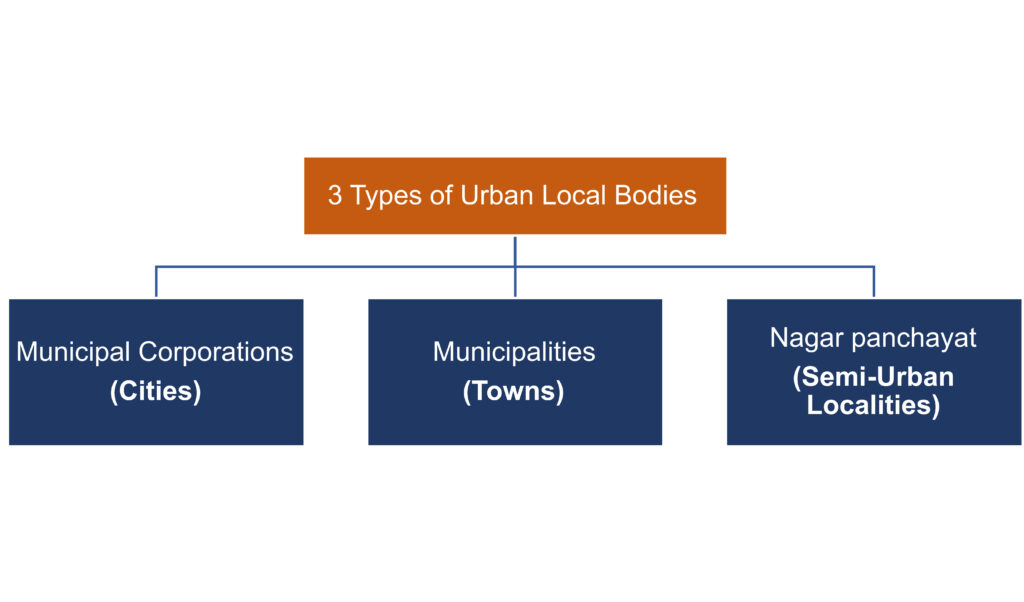Table of Contents
Introduction
Urban local governments (ULGs) are local bodies like municipal corporations or councils that manage cities and towns in India. They are responsible for providing important services such as water, roads, garbage collection, and other essential needs for citizens.
The idea behind ULGs is to make sure that cities are well-managed and people’s quality of life is improved. In 1992, the 74th Constitutional Amendment Act was introduced to strengthen these local bodies and ensure they function properly. However, even after more than 30 years, many of the goals of this law are still not fully achieved.
Article Explanation
Problems Urban local government Face
One of the biggest issues with ULGs is the delay in holding elections. The Constitution requires elections for these local governments to happen every five years, but they are often delayed. In fact, more than 60% of ULGs in India have had elections delayed, according to a report from the Comptroller and Auditor General (CAG) in 2024.
When elections are delayed, the State governments take control of these cities, which goes against the idea that local governments should be independent and self-governed. This makes it harder for local leaders to address the needs of their communities and weakens local democracy.
Even when elections do happen, there are often further delays. After the election results are declared, it can take months for the elected councils to start their work. For example, in Karnataka, it took an average of 11 months after the results for councils to begin functioning.
During this time, the State government continues to control the cities, preventing elected leaders from doing their job. This is another way in which the local governments are not able to work efficiently.
Another problem is the weakness of State Election Commissions (SECs), which are the bodies responsible for organizing elections for ULGs. The SECs don’t always have the power or resources they need to do their job properly.
In many cases, they are not allowed to handle tasks like deciding the boundaries of wards or handling seat reservations. These tasks often get delayed because of political interference or legal issues, making it harder to hold elections on time.

One Nation, One Election
There has been a proposal for “One Nation One Election,” where national and state elections would be held at the same time across the country. This idea has been discussed widely, but it often leaves out ULG elections.
The reason given for this is that ULGs are considered a “State subject,” meaning they are controlled by State governments. Synchronizing elections for thousands of ULGs across the country is seen as difficult. However, some experts believe that holding ULG elections along with national and state elections could help make the election process more efficient and bring attention to the importance of local governance.
What the Experts Say?
To improve the situation, experts suggest that State Election Commissions should be given more power and independence to manage elections without interference. ULG elections also need to be held on time, as required by the Constitution. Delays in elections hurt the functioning of local governments and reduce accountability to the people.
The government is working on ways to fix these problems. A High-Level Committee has recommended that ULG elections be synchronized with national and state elections within 100 days, and this idea has been accepted by the government. The government is also seeking feedback from people across the country to improve the election process.
Overall, ULGs play a vital role in managing cities and improving the lives of people. Regular and timely elections, along with more power for local governments, will help make cities better places to live. It will also strengthen democracy at the local level and support India’s growth and development.
.
.
.
…join our telegram channel for regular updates of The Hindu Epaper Editorial Explanation-https://t.me/Thehindueditorialexplanation
The Hindu Epaper Editorial Explanation given by Hello Student is only a supplementary reading to the original article to make things easier for the students.
In conclusion, preparing for exams in India can be a daunting task, but with the right strategies and resources, success is within reach. Remember, consistent study habits, effective time management, and a positive mindset are key to overcoming any academic challenge. Utilize the tips and techniques shared in this post to enhance your preparation and boost your confidence. Stay focused, stay motivated, and don’t forget to take care of your well-being. With dedication and perseverance, you can achieve your academic goals and pave the way for a bright future. Good luck!
The Editorial Page of The Hindu is an essential reading for all the students aspiring for UPSC, SSC, PCS, Judiciary etc or any other competitive government exams.
This may also be useful for exams like CUET UG and CUET PG, GATE, GMAT, GRE AND CAT
To read this article in Hindi –https://bhaarat.hellostudent.co.in/

